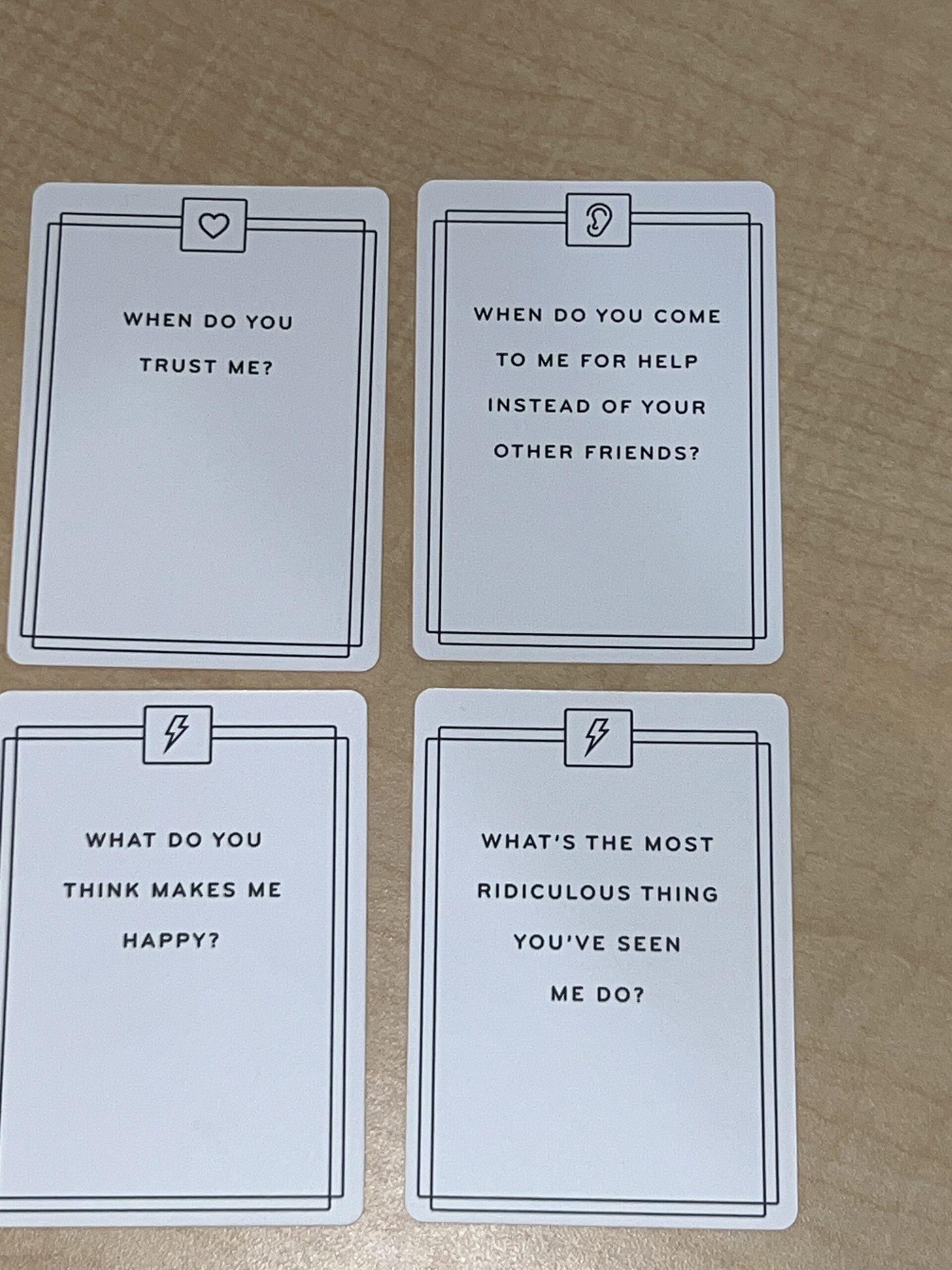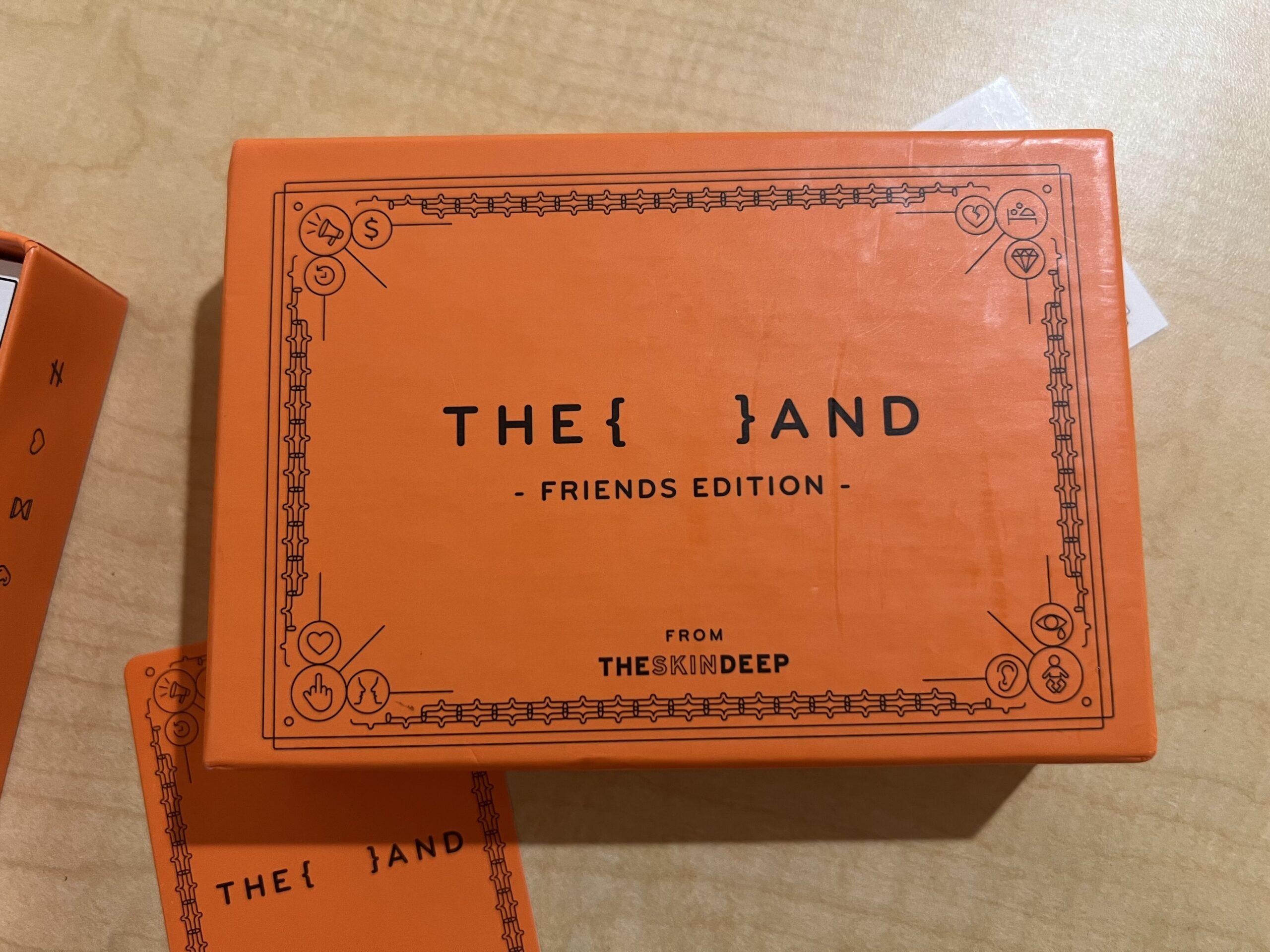Game: {the and} Friends Edition
Creator: The Skin Deep
Platform: Digital/Physical card game (I played in person)
Target Audience: (Close) Friends or acquaintances
Skin Deep’s {the and} Friends Edition” encourages players to interact and engage with each other by creating a safe and supportive environment for sharing personal experiences, stories, and emotions. Through physical proximity, eye contact, open-ended questions, and the requirement for genuine engagement, the game fosters vulnerability and authenticity, leading to meaningful connections and deeper relationships among players.

At the start of the game, players are required to sit facing each other within a comfortable distance, which fosters a sense of intimacy and connection. Not only does this satisfies the sensual need, this mechanic creates a satisfying game since people feel more connected to each other. Additionally, the game also prompts players to take 30 seconds to relax and make eye contact with each other, allowing them to lower their guard and solidify the magic circle being created around the distance that was set. It becomes an unspoken agreement that within this boundary, players are going to answer personal questions that may lead to vulnerable or unexpected answers.

The game features open-ended questions that range from silly to heartbreaking to exciting. This wide range of prompts gives the player a feeling of autonomy, where they can choose how vulnerable and open they would like to be. For example, one question asked was “What do you think makes me happy?” which could be answered in one word like “Food” or prompt something much deeper, like “feeling connected with my parents even though we are hundreds of miles apart.” All players have the agency to respond in a way that is most comfortable for them, while also allowing room for creative expression. Anything can be said on the floor so they can choose to take up as much time as they can to convey what exactly they are feeling. These open-ended questions also made it so questions and answers were always unexpected. People couldn’t come into this game picking and choosing specific prompts that they wanted to answer. They had to pick randomly and commit. I found that since this forced people to think on the spot, they seemed more likely to talk longer to give their answer and explain it through because they weren’t allowed to premeditate it beforehand. This also creates a sense of fun through discovery, because you will always learn something new about the players that you never would have known otherwise.
Not to mention, the roles of having both a speaker and listener(s) at the same time surprisingly led to a dynamic of a reciprocation of vulnerability. When opening up on one question, usually the following answers would become more and more vulnerable and authentic. Of course, there is the occasional hehe, haha answers but in general this design of taking turns to ask and respond to questions create a space where each player feels heard and important since they all have equal opportunities to contribute to the conversation. This game was designed in a way where it is not possible for one voice to dominate the entire time. When all players are reciprocating this vulnerability and also taking turns to contribute, they feel satisfied and more connected when both speaking and listening.
Lastly, I love that the cop out mechanic is designed in a way where players are still engaging in intimacy and connection. If a player wants to pass on a question, they must maintain eye contact for 10 seconds. This pause forces them to take space for themselves and give a safe way for them to indicate to other player(s) that they want to pass, but still acknowledge that they are still being vulnerable. Compared to other get to know you games that offered a pass, I think this mechanic encouraged me to pass less because of how delayed and intentional it is. It’s easy to become trigger happy and constantly pass for other games where you can just refuse to answer and instantly move on.
One thing I would like this game to consider is possibly a requirement for all players to answer the question, even the one asking it. When I played this game with one other player, we started out rotating between asking and answering but felt that it was quite disjointed and an interview at times. We ended up modifying the game to where we both answered the question even though it was not a requirement or expectation for the person asking the question to also answer it. This way, it felt more like a conversation and allowed us to build off each others answers.



